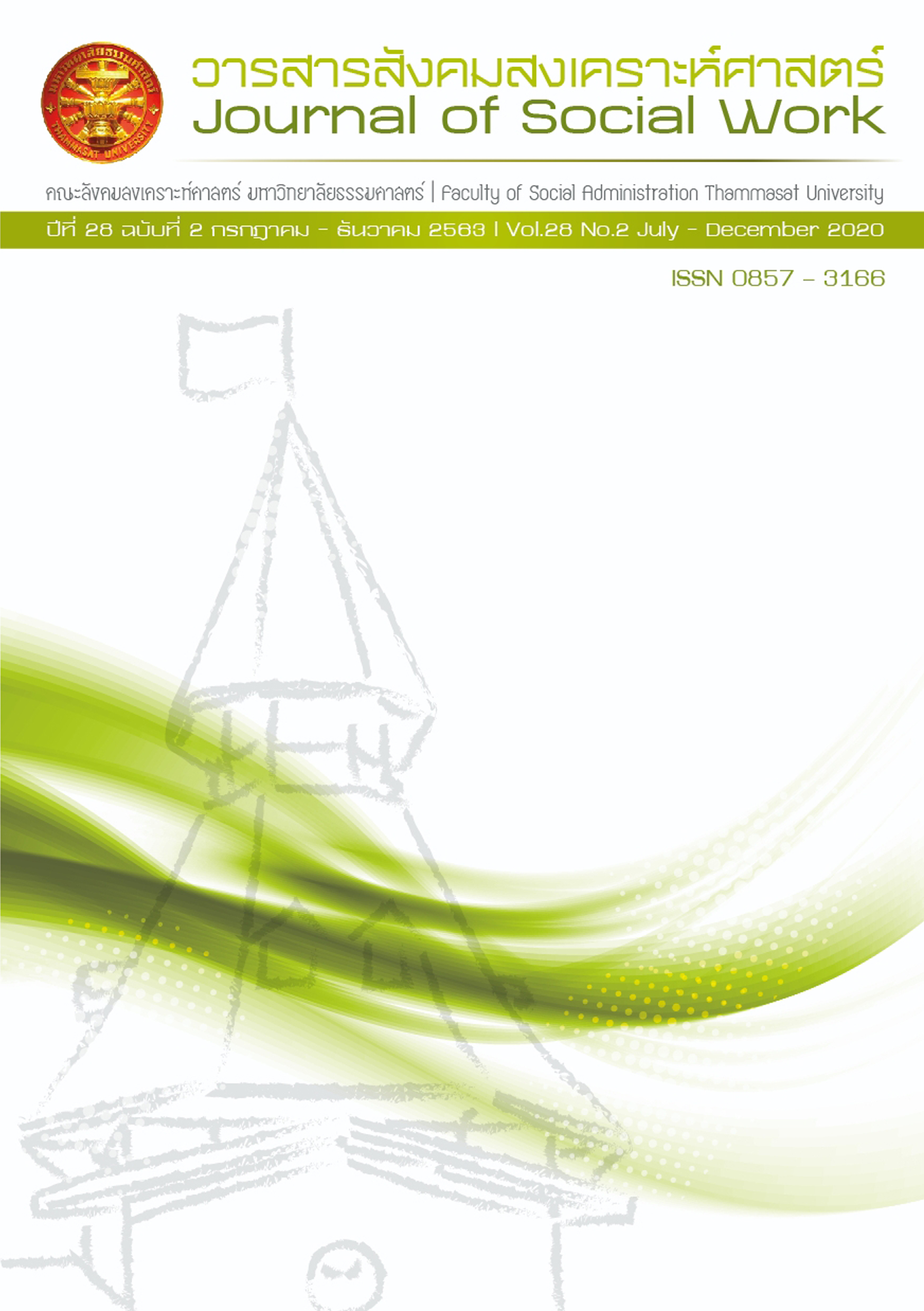ADAPTATIONS OF ADOLESCENTS TO MATERNAL ROLE: A CASE STUDY OF RAK DHARUN CLINIC, SURATTHANI HOSPITAL
Keywords:
Teenage mothers, maternal role, adjustingAbstract
The purpose of this research is to study the adaptation of adolescents to maternal role using qualitative research methods. The data were collected using a semi-structured interview form. Participants in the research were teenage mothers aged 15-19 years who are not pregnant with their first pregnancy, have given birth to a child for a period of not more than 1 year, currently still living with their husband, and used to receive service at Rak Dharun Clinic (Surat Thani Hospital). The study found that total of 13 cases of teenage mothers have a positive view on the word "mother" and "motherhood role" and see the importance of mother role in the family. In which the adolescent mother has to adapt to maternal role physically, mentally and socially in 6 phases as follow: 1) Accepting the pregnancy- teenage mothers show acceptance of pregnancy by taking care of their physical health and antenatal care. Although most teenage mothers have to face negative emotions due to concerns about the disclosure of pregnancy by family, relatives, friends and neighbors. Though they are the uttermost important people for the social adjustment of adolescent mother to accept the pregnancy. 2) Establishing relationships with babies- adolescent mothers in all cases establish relationships with children by raising children and breastfeeding them since after birth. As well as having frequent discussions and playing with children. 3) Adaptation to change in oneself- teenage mothers experienced illness during pregnancy will need to find ways to look after oneself according to each individual's symptoms and diseases. They also have to adapt and manage negative emotional changes with stress and worry about raising children and economic problems. 4) Adjustment to changes in relationships with spouse- The need to change on sexual relationship with their husband, in which the husband showed more love and attention to teenage mothers Including the duty of father to look after children together. 5) Preparation for birth and motherhood- teenage mothers need to prepare their body before given birth along with planning for raising children, contraception, education and careers. All teenage mothers have learnt to cope with the society about being a mother from a family member as well as online media. 6) Accepting motherhood roles- adolescent mother can accept their role as mother with help from families, schools, neighbors and communities with children are the main factors affecting positive feelings, happiness and success in maternity duties. The important suggestion from the study is that it should be integrated with relevant departments. Whether it is health agencies, schools, establishments, families and communities to support the maternal role of teenage mothers in childcare, emotional support, both during pregnancy and after childbirth, further education and careers.
References
กิตติพงศ์ แซ่เจ็ง และคณะ. (2557). คู่มือแนวทางปฏิบัติการดูแลแม่วัยรุ่น (พิมพ์ครั้งที่ 1). กรุงเทพมหานคร: ศูนย์สื่อและ สิ่งพิมพ์แก้วเจ้าจอม.
จอมขวัญ เกตุแก้ว. (2555). การศึกษาสภาวะจิตสังคมและการปรับตัวสู่บทบาทการเป็นมารดาของมารดาวัยใสภายหลังได้รับ บริการสังคมสงเคราะห์. (วิทยานิพนธ์ปริญญามหาบัณฑิต). มหาวิทยาลัยธรรมศาสตร์, คณะสังคมสงเคราะห์ศาสตร์, สาขาการบริหารและนโยบายสวัสดิการสังคม.
นฤมล นิราทร. (2561). การเปลี่ยนแปลงทางสังคมและปัญหาสังคม (พิมพ์ครั้งที่ 1). กรุงเทพมหานคร: สำนักพิมพ์ มหาวิทยาลัยธรรมศาสตร์.
บุญทวี สุนทรลิ้มศิริ และคณะ. (2552). ผลของการพยาบาลแบบสนับสนุนประคับประคองในระยะคลอดต่อความเครียดและ การรับรู้ประสบการณ์การคลอดของมารดาวัยรุ่นครรภ์แรก. รามาธิบดีพยาบาลสาร, 15(3), น. 361-372.
บุญมี ภูด่านงัว และคณะ. (2556). ตัวตนใหม่: ประสบการณ์การเป็นมารดาของนักเรียนที่ตั้งครรภ์โดยไม่ตั้งใจ. วารสารสภา การพยาบาล ปีที่ 28 ฉบับที่ 2.
พัชชา เจิงกลิ่นจันทร์. (2556). กระบวนการปรับตัวและการอบรมเลี้ยงดูบุตรของแม่วัยรุ่นที่ต้องดูแลบุตรเพียงลำพัง: กรณีศึกษาผู้ใช้บริการของสหทัยมูลนิธิ. (วิทยานิพนธ์ปริญญามหาบัณฑิต). มหาวิทยาลัยศรีนครินทรวิโรฒ, สถาบันวิจัยพฤติกรรมศาสตร์, สาขาการวิจัยพฤติกรรมศาสตร์ประยุกต์.
ภาวดี ทองเผือก. (2547). ผลของการใช้โปรแกรมส่งเสริมการรับรู้ความสามารถของตนเองที่เน้นการสนับสนุนจากสามีต่อการ ปรับตัวด้านบทบาทหน้าที่การเป็นมารดาในหญิงตั้งครรภ์วัยรุ่นครรภ์แรก. (วิทยานิพนธ์ปริญญามหาบัณฑิต). จุฬาลงกรณ์มหาวิทยาลัย, คณะพยาบาลศาสตร์.
เยาวลักษณ์ เสรีเสถียร. (2543). ปัจจัยที่มีอิทธิพลต่อการปรับตัวด้านบทบาทหน้าที่ของการเป็นมารดาในระยะตั้งครรภ์ของ หญิงวัยรุ่น. (วิทยานิพนธ์ปริญญาดุษฎีบัณฑิต). มหาวิทยาลัยมหิดล, คณะพยาบาลศาสตร์.
วีรพล กิตติพิบูลย์. (2555). ภาวะแทรกซ้อนทางสูติศาสตร์ของการตั้งครรภ์ในวัยรุ่น. วารสารการแพทย์โรงพยาบาลศรีสะเกษ สุรินทร์ บุรีรัมย์, 27(1), น. 97-105.
ศรีเรือน แก้วกังวาน. (2549). จิตวิทยาพัฒนาการชีวิตทุกช่วงวัย วัยรุ่น-วัยสูงอายุ (พิมพ์ครั้งที่ 9). กรุงเทพมหานคร: สำนักพิมพ์มหาวิทยาลัยธรรมศาสตร์.
ศศิธร บรรณเสถียนศรี. (2552). ความกังวลใจของแม่ต่อการเลี้ยงดูบุตรชายวัยประถม เพื่อมิให้เสี่ยงต่อภาวะรักเพศเดียวกัน. (วิทยานิพนธ์ปริญญามหาบัณฑิต). มหาวิทยาลัยธรรมศาสตร์, วิทยาลัยสหวิทยาการ, สาขาวิชาสตรีศึกษา.
สุรีย์ ล่าร้อง. (2552). ผลของโปรแกรมการส่งเสริมบิดาให้มีส่วนร่วมเลี้ยงดูบุตรคนแรกต่อพฤติกรรมการเลี้ยงดูบุตรและ สัมพันธภาพระหว่างบิดา มารดาและบุตร. (วิทยานิพนธ์ปริญญามหาบัณฑิต). มหาวิทยาลัยธรรมศาสตร์, คณะ พยาบาลศาสตร์.
สำนักงานปลัดกระทรวงการพัฒนาสังคมและความมั่นคงของมนุษย์. (2559). สถานการณ์การคลอดบุตรของวัยรุ่นไทย. เข้าถึง ได้จาก https://www.govchannel.go.th/?landing=true สืบค้นเมื่อวันที่ 28 มกราคม 2563.
สำนักอนามัยการเจริญพันธุ์. (2562). สถานการณ์อนามัยการเจริญพันธุ์ในวัยรุ่นและเยาวชน ปี 2561. เข้าถึงได้จาก http://rh.anamai.moph.go.th/download/all_file/index/%E0%B8%AA%E0%B8%96%E0%B8%B2%E0 %B8%99%E0%B8%81%E0%B8%B2%E0%B8%A3%E0%B8%93%E0%B9%8CRH_2561_Website.pdf สืบค้นเมื่อวันที่ 15 มีนาคม 2563.
สำนักอนามัยการเจริญพันธุ์. (2559). พระราชบัญญัติการป้องกันและแก้ไขปัญหาการตั้งครรภ์ในวัยรุ่น พ.ศ. 2559. เข้าถึงได้ จาก http://rh.anamai.moph.go.th/main.php?filename=Act สืบค้นเมื่อวันที่ 15 มีนาคม 2563.
Rich Adrienne. (1977). Of Women Born: Motherhood as Experience and Institute. London: Virago.
Downloads
Published
How to Cite
Issue
Section
License
The manuscripts published in the Social Work Journal is the copyright of the Social Work Journal, Thammasat University
Any article or opinion appeared in the Social Work Journal will solely be under the responsibility of the author The Faculty of Social Administration, Thammasat University and the editors do not need to reach in agreement or hold any responsibility.



